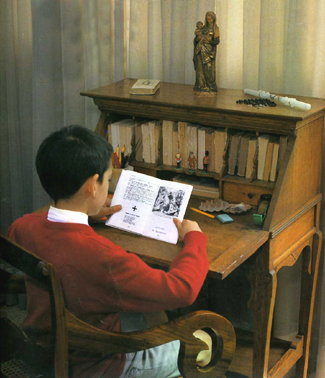 |
Formation of Children
Order and the Spirit of Order
Marian T. Horvat
Chapter IV of the Small Manual of Civility addresses an important topic often overlooked in manners books. The topic of order is especially important for counter-revolutionaries, given that the word revolution means to upset something that is in order, and to establish disorder in its place. It makes sense that a counter-revolutionary man will respect and love order in his daily life. For this, he needs to develop the habit of order from the time he is young. Good parents and teachers will help him to follow a schedule, and insist that he maintain order in his person and belongings. Later, he will reap the good fruit from having the spirit of order in his life.
Order is the practical expression of a regulated life. The spirit of order is the inclination – innate or acquired – toward this regularity.
The spirit of order is a most precious quality. It should be included as one of the most indispensable attributes of a man in his private as well as social life, because it extends itself beneficially to our personal actions as well as our relations with our neighbor.
This most beautiful attribute exercises a decisive influence over a man’s success in life. Order gives value to our talents and qualities, and makes them fecund, just as its absence renders our highest aspirations barren and our best gifts futile.
Order is economy of time and money; it allows us to give a better quality and greater quantity of results in both our material and intellectual labors because with it, we take full advantage of time, avoiding dawdling, delay, and doubt. Disorder is the dissipation of time and talent, the ruin of all the advantages of organization.
With regard to order, this most valuable attribute, let us observe a man in the various stages of his life.
The student
The student who despises the supreme rule of order – “A place for everything and everything in its place” – lives in an interminable round of irritation and turmoil. At the end of the day, when he returns from school, he throws his book bag [today we would say backpack] and books anywhere instead of placing them in the proper place, which is always the same.

An ordered desk forms an ordered mind |
So there are his books – on a bench, a chair, the top of a bed or bureau, perhaps in the kitchen or a bench on the porch.
If another person without the spirit of order happens upon it, the book bag is tossed aside, perhaps kicked out of the way, and ends up in another place. This could just be the beginning of its travels. In the kitchen, it becomes stained, on the porch, it is soiled; in the hall, it is stepped on.
When it is time to study, the boy can be heard shouting, “Where is my book bag? Who has taken my books?” With all this comes a loss of time, irritation, and bad moods.
Then, we open this famous book bag, and we see that nothing is in its proper place: pens, pencils, books, notebooks, rulers - everything is mixed up. The disorder is so great that to find his eraser, he has to empty its whole contents.
Now, let’s look at the books and notebooks: here one notes the same phenomena. Nothing is clean; there are cartoons and ridiculous scrawling on the covers and even on some pages.
His homework also lacks order. The writing is not on the lines, the letters are poorly formed, the periods, commas, and punctuation marks seem to have been spilled into the text like pepper on macaroni, everything here, nothing there.
A book bag and desk are, in fact, like a world in miniature, reflecting its owner, as well as telling much about the school, lessons, and method of teaching. To the question of whether or not a person is ordered or disordered, his desk will respond, answering with either praise or criticism. Further, this response will be true for many years to come. It predicts the way of life of this boy, the man of tomorrow, more surely than could any palm reader or fortune teller.
One can see that from the time one is young, it is necessary to have the habit of order in the way of treating one’s books, notebooks, and articles of clothing. The habit of order accompanies a man throughout his whole life. It is as inseparable from him as his very name.
The young man
The moment necessarily arrives when the boy takes on the responsibilities of life, becoming the master of what he will do and how he organizes his time
When he is faithful to the recommendations of his old masters and educators, he knows how to arrange his schedule and rule of life, which directs all his interests. There are four parts to this daily schedule, which begins with fervent prayer. The first deals with his daily and weekly religious practices; the second pertains to his occupation and method of work; the third concerns his family relations, and the fourth, his social relations. That is, he orders his life, giving priority to the essential and most important.
The spirit of order acquired during his primary education guarantees him success. By means of this regime of order, he works methodically and produces fruitful works. Following it, he will easily fulfill his duties. His conscience, always at peace, will secure for him a profound happiness, the sweet fruit of subjection to the discipline of duty.

Poor moral health is the sad result of a life without order |
On the contrary, how sad it is to see a young man without the spirit of order and discipline, who is the slave of his incessant changes and whims of the moment. Rising is a new sacrifice each day, since he is the last person in the house to bed. The morning hours, splendid, lucid and most precious, are lost or wasted on frivolities. His room also reflects the lack of order: books and magazines in piles on the floor, shoes and clothing left here and there, a picture of the disordered customs of his life.
His frequent tardiness at the family table deprives his parents of the warm convivium that makes the intimacy of the home so salutary. Frequent entertainments rob part of his days and nights. His time for going to bed is irregular.
With a heavy heart, his father sees a future ahead without bright hopes; his mother waits to hear him enter late at night, weighed down with grief.
Poor physical health and poor moral health are the sad result of a life without order. Where a schedule and order are lacking, the voice of duty is not heard.
Fortune and poverty are distributed by God as He pleases. Some of us, through no merit of our own, enjoy the goods of this earth. Others may have to bear the bitterness of penury.
In general, it is fairly easy to manage a house when a person is wealthy enough to have a large staff of servants. But it is more difficult and meritorious to establish order, cleanliness and hygiene in situations of poverty. There is no doubt that the Holy Family of Nazareth found itself in the second case. It was not wealthy. Nonetheless, order, cleanliness and contentment shone in every corner.
Here is another case. On April 18 the Church celebrates the feast of Blessed Marie of the Incarnation, who was the spouse of a wealthy gentleman Monsieur Pierre Acarie. When her husband encountered difficulties of a political nature, his family estate was seized and he was exiled from Paris. The creditors entered into the house of the family and took everything, the furniture, clothing, and dishware. They didn’t even leave a chair to sit on.
Amid such sorrow and abandonment, this strong, devout woman did not become discouraged. Placing all her hope in God, she worked assiduously, reduced the expenses to the most indispensable, put the sons to work, inspired the confidence of all, and in the end maintained an honest family home and respected name.
Later she entered a convent, introduced the Carmelites in France, and died a saint. Order is the virtue of the rich, and the wealth of the poor.
“I’m too busy to worry about order. If I get through the day, that’s enough,” a busy home-schooling mother of seven children complained. Clearly, the household reflected her attitude.
Her eldest son Henry, age 14, was sitting on a chair in the living room, eating a bowl of cereal and working on some Algebra homework he did not complete the day before. A few smears of milk on the already crumpled paper wouldn’t make any difference. His sister Catherine was eating breakfast in the kitchen in her nightclothes, her hair disheveled. She would probably be late to start class, which was scheduled to begin at 9 a.m., just ten minutes away. Philip, age 10, was still sleeping. He started working on a model ship the night before, and didn’t get to bed until very late. It was a typical morning, no one following the schedule, everyone “doing his own thing.”
I do not underestimate the difficulty in many homes today, where mothers must manage the household, teach the classes and supervise the homework. Nonetheless, even difficult situations would become more bearable if the spirit of order prevailed. It takes a little more effort at the beginning to instill the spirit of order, but once implanted everything becomes easier.
In this case, the application of several rules would make the mornings brighter:
- Everyone must be at the breakfast table properly dressed and groomed for the day.
- No eating in the living room.
- Books and homework are not allowed at the table during meals.
- Everyone goes to bed at the proper hour.

Posted September 28, 2006


Related Topics of Interest
 Chapter 3: How to Sit, Stand, Walk Chapter 3: How to Sit, Stand, Walk
 Chapter 2: Bearing Chapter 2: Bearing
 Introduction and Chapter 1 Introduction and Chapter 1
 Dressing Well - Vanity or Virtue? Dressing Well - Vanity or Virtue?
 St. Isidore of Seville on the Importance of Being Dignified in Manner St. Isidore of Seville on the Importance of Being Dignified in Manner
 Four Ways to Discern a Man's Soul by His Appearance Four Ways to Discern a Man's Soul by His Appearance
 Why Do Only Women Have to Dress Well? Why Do Only Women Have to Dress Well?
 Tradition, Stagnation and Progress Tradition, Stagnation and Progress

Related Works of Interest
|
|
Formation | Cultural |
Home | Books | CDs
| Search | Contact Us
| Donate

© 2002- Tradition in Action, Inc. All Rights Reserved
|
 |
|